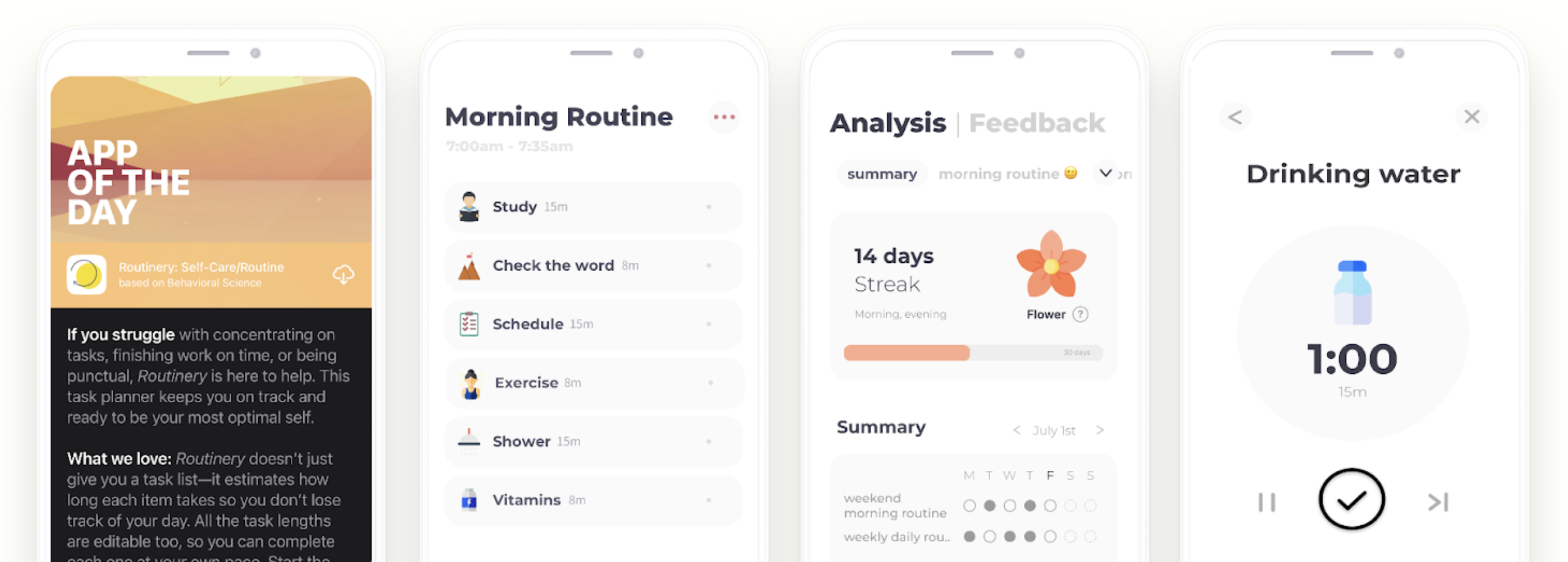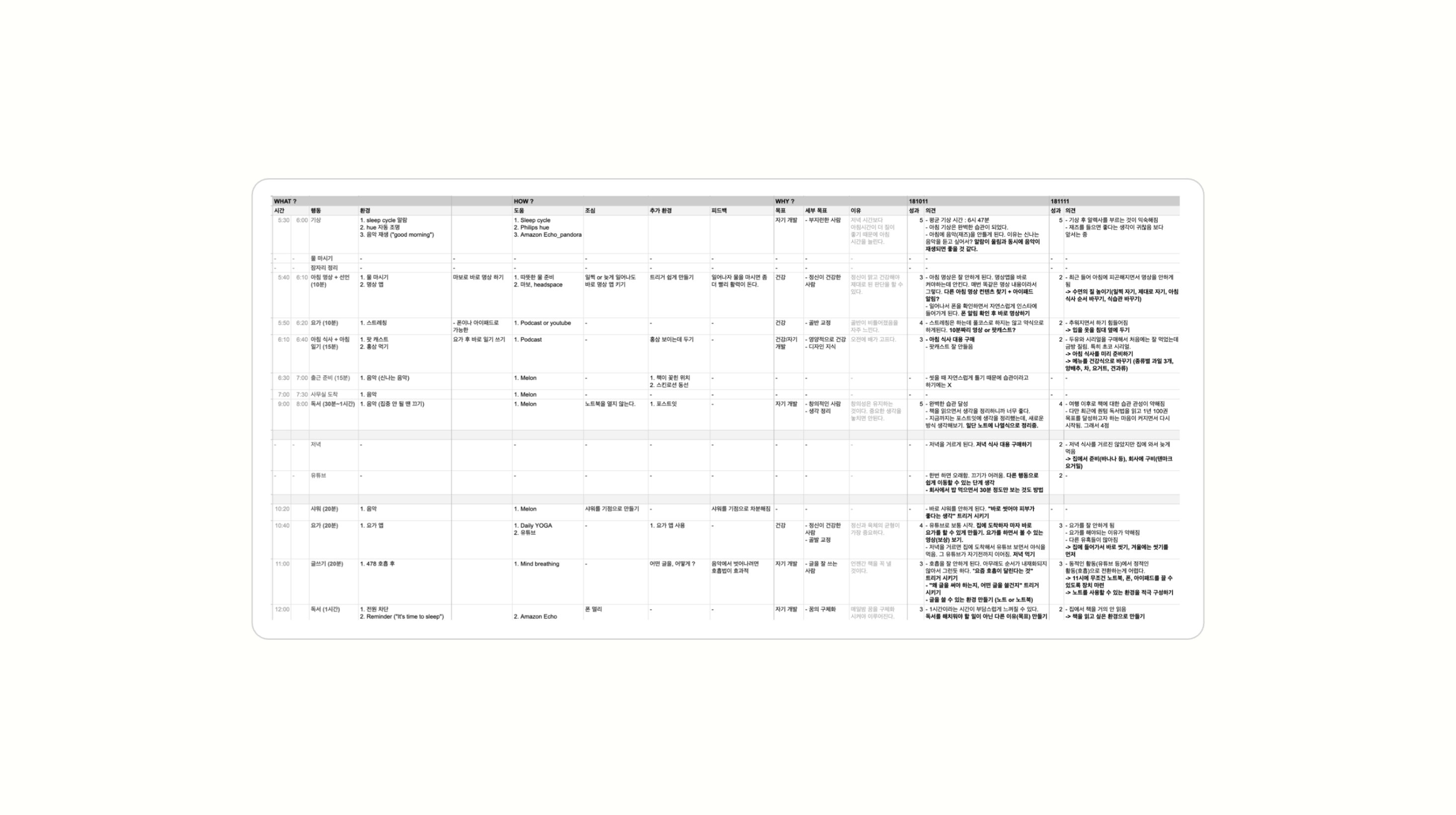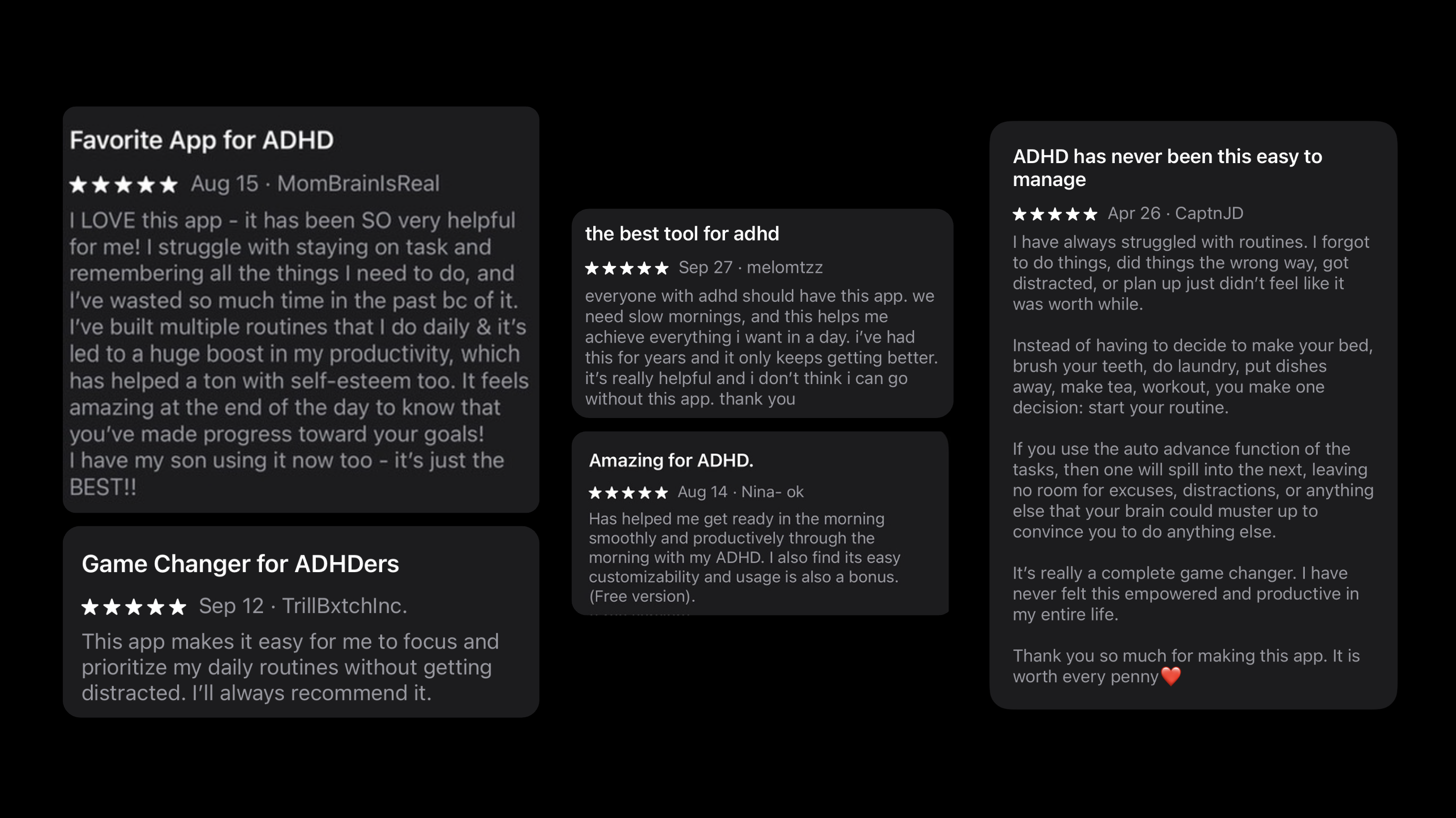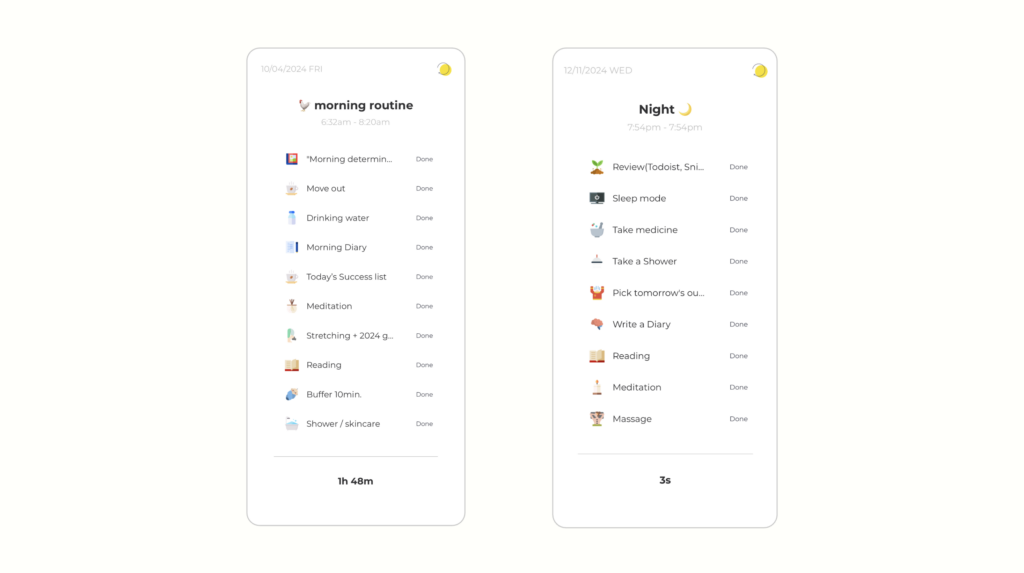Welcome to this edition of our Tools for Thought series, where we interview founders on a mission to help us work smarter and live better. Ian Inseok Seo is the founder of Routinery, a mobile application that helps you design and actually stick to better routines.
In this interview, we talked about environment-driven habit formation, the routines of successful people, how to maintain a balanced life, how to adjust routines over time as needed, the relationship between routines and neurodiversity, and more. Enjoy the read!

Hi Ian, thanks for agreeing to this interview! When did you become interested in helping people design better routines?
My journey into the world of routines began during a challenging period of my life when I faced several entrepreneurial setbacks over about four years. It was during this time that I truly grasped the importance of having structured routines. I found that routines served as a stabilizing force, helping me navigate the uncertainty and frustration of feeling stagnant in my entrepreneurial journey.
To explore this further, I started with simple, self-guided tests. I created an Excel sheet where I documented the environments and times that allowed me to wake up best, detailing everything from music to temperature settings.
I also experimented with different sequences for activities like writing and meditation, adjusting environmental factors to see what worked most effectively. This personal journey highlighted how valuable routines can be, not just for me but potentially for countless others facing similar struggles.
I realized that amidst the chaos, a solid morning routine could set the tone for the entire day. It offered me a way to regain control and establish a sense of purpose. However, I noticed that many people struggle to create effective routines, even when they understand the benefits.
Life can be hectic, and the temptation to prioritize immediate tasks over planning can be overwhelming. People often feel paralyzed by choice, unsure of how to structure their time in a way that aligns with their goals.
Through numerous self-experiments, I tested how my environment changed at different times, and I refined those methodologies over more than two years. This experience sparked the idea: “Could I help others craft their own routines?”
I started by assisting Jane, our current CTO, in developing her routine, and the results were remarkable. This success led me to a bigger vision: to create a platform that could assist even more people in designing effective routines tailored to their needs. That was the seed from which Routinery grew.
Understanding the transformative power of routines is what drives me to help others achieve that clarity and focus in their daily lives.

And what makes your approach different?
What sets Routinery apart is our fundamental focus on environment-driven habit formation. Rather than emphasizing sheer willpower, we prioritize creating the right conditions for people to effortlessly follow their desired routines. This idea is encapsulated in our slogan: “Designed to drive your action.”
Let me illustrate: if you want to read more, simply deciding to read won’t necessarily make it happen. However, if you bring a book and leave your laptop at home, then go to a cozy café, you’ll naturally start reading. This is the power of environmental design, and we’ve embedded this principle into Routinery to help users not just plan, but actually live their ideal routines. In the early days, I honestly didn’t invest too much time in formal user research. My team and I were focused on solving a problem I personally faced, and as a team with the skills to develop an app, we went for it.
We launched Routinery quickly, iterating until it met our standards. But as the app gained traction, we started receiving feedback from users worldwide, and I was struck by how serious and diverse their challenges were.
It became clear that maintaining even small routines, which some might find simple, was deeply difficult for others. And when these small efforts failed, the ripple effect impacted other aspects of their lives, often leaving them feeling overwhelmed and stuck.
From these insights, our mission evolved to “Empowering people to improve their daily lives.” Through ongoing user interviews, we learned that even minor adjustments, like a morning stretch or a few minutes of focused breathing, could have a profound effect on someone’s day. Yet, many people struggle to incorporate these small actions into their routines.
For some, these seemingly simple tasks are monumental. Recognizing this, we felt a stronger commitment to provide a solution that wasn’t just about planning but about creating an environment for consistent, positive change.
That makes sense. Actually, neurodivergent users are particularly enthusiastic about Routinery.
Absolutely, I’m thrilled to discuss this! Routinery has resonated particularly well with neurodivergent users, especially those with ADHD. Our app is designed to help individuals create structure and establish routines, which can be incredibly beneficial for managing symptoms of ADHD.
For many people with ADHD, staying organized and maintaining focus can be challenging. Routinery allows users to break their day into manageable chunks, providing clear, visual cues for each task, which can be especially helpful in navigating tasks one at a time.
This not only aids with time management but also reduces the overwhelm that can come from trying to juggle multiple responsibilities. Features like customizable routines, timers, and task flows empower users to sustain their focus by breaking tasks into manageable steps and creating a sense of accomplishment as they complete them.
For example, a user might set up a morning routine that includes specific times for getting out of bed, showering, and having breakfast. The visual representation of their progress helps keep them motivated and reduces the cognitive load of remembering each step. We’ve also included options for breaks and transitions, which are vital for maintaining focus.
That said, while Routinery is particularly beneficial for neurodivergent individuals, we’ve surpassed 5 million downloads, which speaks to its broad appeal. People from all walks of life use Routinery to design a better day, whether they’re looking to boost productivity, improve time management, or simply cultivate healthier habits. Our goal is to support everyone in building routines that work for them!

You decided to go for a mobile-first approach. Why is that?
When we started Routinery, we knew that routines needed to be woven into the fabric of our everyday lives—not just planned at a desk but accessible in those small moments when people need them the most. That’s why we decided on a mobile-first approach.
Routines aren’t confined to a specific time or place, and to make them truly impactful, they need to be adaptable and available whenever the user requires them. Whether it’s setting a morning routine as you wake up, or a calming evening ritual to wind down, we wanted Routinery to be right there, on-the-go.
A mobile app allows users to check in with their routines anytime, anywhere. This level of accessibility is key to our mission: helping users build sustainable habits that fit seamlessly into their daily lives. Imagine starting a routine on the subway, in a café, or even during a lunch break—it’s possible because of the convenience of a mobile platform.
To make Routinery truly universal, we prioritized making it available on both iOS and Android right from the start. People’s lives are incredibly diverse, and we wanted Routinery to be accessible no matter what device they prefer. By taking this approach, we’re not just supporting different technologies; we’re enabling more people to integrate routines that can help them lead better lives.
Ultimately, our mobile-first design reflects our belief that routines should be something users carry with them—not just as a reminder, but as an empowering tool to create positive changes throughout their day, wherever they are.
So, how does Routinery work, exactly?
Routinery is designed to make routine-building simple, effective, and — most importantly — personal. At its core, the app allows users to create customized routines made up of small, actionable tasks. Users can select from suggested activities or add their own, crafting a routine that aligns with their unique goals and daily needs.
Our approach is deeply rooted in behavioral science principles, particularly two key concepts. The first is habit stacking. Instead of the traditional checklist style, where users mark tasks one by one, Routinery prompts users to start their first task and then naturally flow into the next.
Once they’ve taken that initial action, momentum builds, making it easier to carry on with subsequent tasks without overthinking. By having everything mapped out in advance, they’re free to focus on simply doing.
The second principle is the use of a timer with a time limit. Humans are naturally more focused when we have a set amount of time for a task. This is especially helpful in the morning when distractions are everywhere. The timer provides a gentle sense of urgency, helping users to stay focused and avoid being sidetracked.
We wanted Routinery to support users with planning and executing routines seamlessly. When planning, users have a range of options to customize their routines. But when it’s time to put those routines into action, we aim to minimize distractions and maximize focus. This flow encourages users to follow through and complete their routines consistently.
Additionally, we’ve put a lot of thought into human-friendly interactions to make the experience feel less mechanical and more like a supportive companion. Instead of just sending reminders, Routinery communicates with users in a way that feels natural and encouraging.
We’ve also been intentional with our UX writing for push notifications, ensuring that users feel motivated and supported rather than burdened. Our goal is for Routinery to feel less like an app and more like a helpful friend guiding them through their day.
To make all this possible, we’ve put a lot of effort into a clean, simple mobile design. We believe in reducing friction and making the app experience intuitive, so users can focus on what matters — their routines. Through this streamlined design, Routinery becomes not only a tool but a friendly, reliable guide in building the life they want.

You have spent lots of time researching the routines of successful people. What are some of your favorites?
At Routinery, we highlight the routines of several well-known figures, including Andrew Huberman, Jeff Bezos, Tim Cook, Tim Ferriss, and Haruki Murakami. While each of these routines is unique, they all share a common thread: dedication to consistency and a clear sense of purpose.
Personally, I don’t have a favorite routine, per se. Instead, I’m inspired by the commitment these individuals demonstrate in maintaining their routines. Observing their dedication helps remind me that routines aren’t about perfection but about consistent effort. This realization has been especially meaningful for me, as it offers reassurance that small, sustained actions can make a significant impact over time.
Recently, I’ve become more interested in running and writing, which is why Haruki Murakami’s routine resonates with me. Murakami is known for his disciplined approach to both his writing and his physical well-being—running a marathon every year, maintaining a strict daily schedule, and ensuring he has the mental space to create. His consistency is incredibly inspiring, and it motivates me to keep pushing forward in my own pursuits.
On the other hand, I also draw a lot of methodological inspiration from Andrew Huberman. His emphasis on science-backed practices for optimizing both physical and mental performance aligns with our mission at Routinery to make habit-building an intentional and effective process. Observing how he incorporates scientific principles into his routine has given me ideas on how to support Routinery users more effectively in structuring their daily habits.
Ultimately, I think the most powerful takeaway from these routines is the reminder that finding a rhythm that works for you—and sticking with it—can be transformative. We all have unique needs, and by curating a routine that aligns with our personal goals, we can achieve more balance and fulfillment in our daily lives.
What about you, how do you use Routinery?
In the early days, I experimented with several routines, but over time, I found that simplicity works best for me. Now, I keep my routines straightforward, focusing on a few key rituals that help me stay grounded and productive.
My regular routines include a morning and evening routine on weekdays, a cleaning routine on Saturdays, and a Sunday evening routine to prepare for the week ahead. I also use Routinery’s Pomodoro timer on a more flexible basis—primarily when I need extra help staying focused on a task.
In the morning, I use Routinery to guide me through calming activities like meditation and writing. Starting the day with a clear, centered mind is crucial because my days tend to be filled with fast-paced work and various demands. This morning routine gives me a moment to anchor myself, allowing me to approach the day with greater resilience.
My evening routine is a time for reflection and unwinding. I often review my day, noting any significant moments or insights and letting go of lingering concerns. The routine helps me mentally put the day to rest so I can transition smoothly into sleep. I also include activities like meditation and stretching to help my body relax and ensure I’m prepared for restful sleep.
Over time, I adjust my routines as needed, expanding or simplifying them depending on my situation. I’ve learned not to be rigidly bound by routines but rather to let them work in a way that suits me best. This flexibility is key to keeping routines sustainable and beneficial over the long term.
Routinery has become an essential tool that helps me maintain a balanced and intentional life. I love that I can keep these routines tailored to my needs, and I find the app’s customizable reminders and timer functionality invaluable for keeping me on track. Routinery is a constant reminder that I can set the tone for my day, and I appreciate having a system that supports me in creating my ideal environment for each part of my routine.
The best part is that I get to use the very service I’m building every day. It brings me a deep sense of happiness and gratitude to know that while I’m helping others, I’m also helping myself. As an entrepreneur, I consider it a blessing to create something that has a meaningful impact—not only on our users’ lives but on my own as well.
And finally… What’s next for Routinery?
At Routinery, our mission is clear: to empower people to improve their daily lives. While we’re currently focused on providing this support through our app, we’re excited to take our vision even further. We’re constantly researching ways to create environments and develop tools that make positive change feel natural and effortless. Our goal is to help people overcome the challenges of personal growth by designing solutions that support their unique journey, every step of the way.
In terms of future directions, we’re exploring beyond just the Routinery app. We envision expanding our offerings to include additional apps, as well as offline events that bring our community together to share insights and support one another. Ultimately, we aim to deepen our understanding of human behavior and use that knowledge to make meaningful contributions to the science of personal transformation.
We also see the future of Routinery moving into the wellness space, where we can expand our focus from behavior improvement to mental wellness. We believe that partnering with experts in fields such as psychology and mental health can help us offer even more valuable support for our users.
Many people who use our app face challenges such as ADHD, depression, and insomnia. Our goal is to help them with tailored routines that offer not only structure but also comfort. We’re designing these features with the same intention and attention to behavioral science, ensuring that even wellness-focused additions like mindfulness routines or tailored support for conditions such as ADHD or insomnia are practical, engaging, and easy to implement in daily life.
We want Routinery to be a service that aids in alleviating mental health challenges, providing a path to more balanced, fulfilling lives.
As we look to the future, we’re also excited by the potential of IoT (Internet of Things) to bridge the gap between digital and physical environments. Imagine a meditation session that automatically sets the room lighting, adjusts the temperature, and plays soothing music the moment you start a meditation timer. By creating these kinds of immersive environments, we can help users enter the right state of mind for their routines without extra effort.
Our long-term vision is to create a world where change is accessible to everyone—where the barriers to personal growth are minimized by science-backed solutions and intentional design. Whether through technology, events, or scientific research, we’re committed to helping people make lasting improvements to their daily lives.
I believe that as we continue to evolve, Routinery will remain a trusted companion that helps people live with more ease and fulfillment. We envision Routinery as more than just an app—it’s a catalyst for a global movement toward mindful, purpose-driven lives.
Thank you so much for your time, Ian! Where can people learn more about Routinery?
Thanks for having me! You can go to our landing page, blog, YouTube, Instagram, or head directly to the store to install the app.
